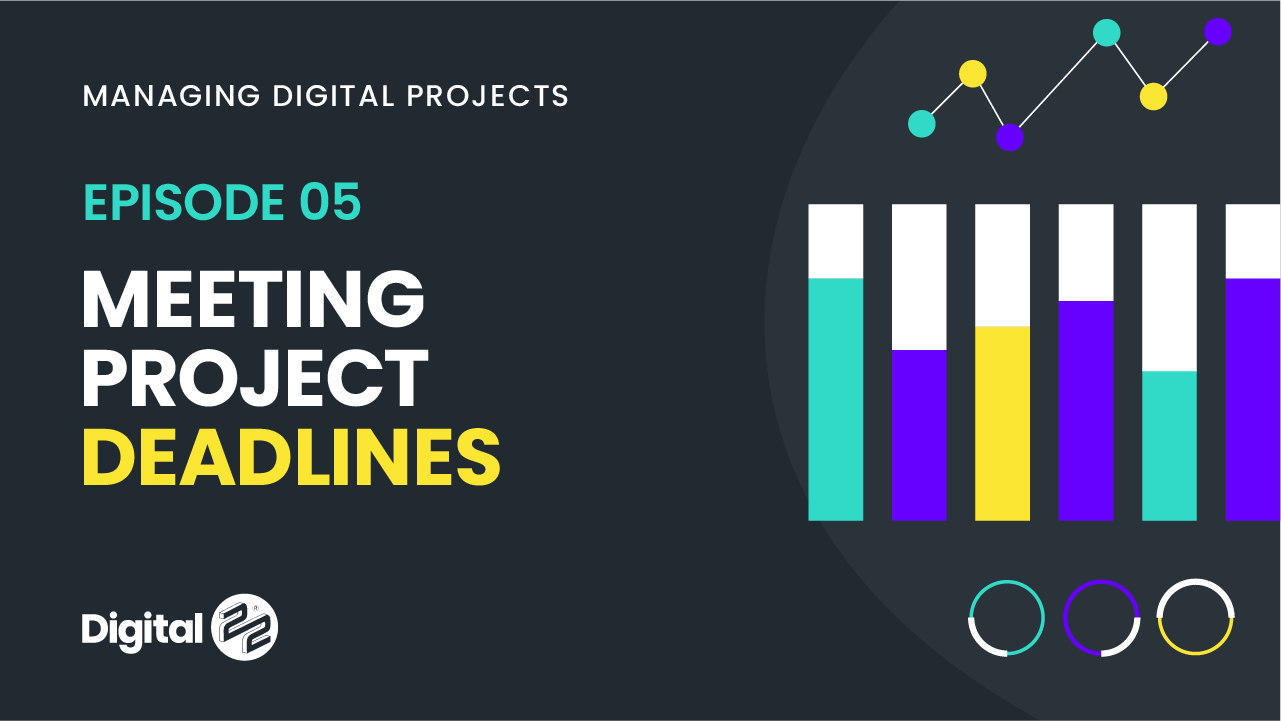From a young age, we get taught to be fearful of deadlines; exams, bedtimes, closing dates, you name it. Where there's pressure, there's a deadline ⏰
But deadlines aren't a bad thing. In the world of digital marketing, they help manage expectations and keep projects on track. Setting due dates is how we maintain positive client relationships and respect the internal deadlines that our clients need to meet.
That's exactly what Tom and Faizal of our Projects team discuss in episode five of the Managing Digital Projects podcast. Don't miss out on their insights — hit the play button to tune in.

How to stop dreading deadlines
Get rid of deadline trauma by following these simple steps, all of which we cover in more depth on the podcast:
Assess project scope
Before anything, you need to get a bird's-eye view of the project.
Websites are a great example of this. It's important to set a clear start and end date — often known as a 'go-live date' in web projects. Not only this, but it's also imperative you learn the client's primary objective and motivation for the build, as well as how the project will look in terms of how many phases (or gates) you'll need to go through to get to the final outcome.
Misreading project scope can push budgeting, timelines and our team's sanity to its limits 🧠
Poor project scoping fails everyone — it's never good for our team or the client. So, make sure you know what you agree to when putting together a plan.
Set specific actions
Going deeper than 'what needs doing' allows you to understand who'll deliver the task, how they'll deliver it, why they'll deliver it and when it'll be delivered. This can be broken down to every mini-milestone and every single action needed to pull the whole thing off.
We like to get really granular with our projects, inputting every task and timing into our project management system. It's clearer and more manageable for everyone, especially our project managers who need to oversee the whole thing 🔍
Specific actions help hold the whole team accountable and allow us to pinpoint micro-level problems during each phase or 'gate' of a project.
Under-promise and over-deliver
A classic tactic is to under-promise and over-deliver. If something is projected to be complete in a week, tell the client it'll be ready in two.
Why do we do this? To allow a margin for error. We understand humans aren't perfect. We might experience absence, unforeseen issues and miscommunication. Any number of things can push the project off-track 🛤
In digital projects, always expect the unexpected. Try to strike a balance with how much buffer you account for. You'll always want to achieve the forecasted number of deliverables for the wider company and mitigate the impact delays can have on other projects.
Utilise client education
We constantly talk to our clients, with our HubSpot Consultant role dedicated to doing just this.
By keeping the lines of communication open, we're not only strengthening our bond and carefully engaging in relationship management, but we're also continually educating the client to understand the ins and outs of achieving their goal 🎯
Setbacks are inevitable. So, being honest about them as they happen and giving the client context about why a deadline might be pushed back — including if it's their actions that have caused it — is super important in creating a satisfied customer and adding another project to our list of success stories.
Create notifications and triggers
Using software to show progress and highlight potential issues helps bring the most time-sensitive errors to attention, especially for those juggling multiple projects.
At project management level, where you're working on more than one account and more than one objective, it's crucial to leverage the power of technology to do some of the hard work for you 📈
For us, we utilise triggers and notifications as much as is possible in our current tech stack. Plus, we're always learning about new avenues for automation and reporting, refining the way we manage projects as we progress.
Could you listen to project management content all day?
Now, you can. Learn more about keeping projects on track with new episodes of Managing Digital Projects appearing on YouTube or our Video Hub.
While most digital marketing podcasts focus on the mastery of a single discipline — and we've got plenty of them — Managing Digital Projects gives the guys behind-the-scenes a platform to share what it's like to be in charge of an overall project deliverable and guide each specialist to success.
Check them out today.



